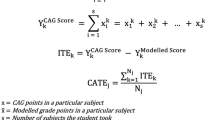Abstract
In this work, we investigate the degree-awarding gap in distance higher education by studying the impact of a Predictive Learning Analytics system, when applying it to 3 STEM (Science, Technology, Engineering and Mathematics) courses with over 1,500 students. We focus on Black, Asian and Minority Ethnicity (BAME) students and students from areas with high deprivation, a proxy for low socio-economic status. Nineteen teachers used the system to obtain predictions of which students were at risk of failing and got in touch with them to support them (intervention group). The learning outcomes of these students were compared with students whose teachers did not use the system (comparison group). Our results show that students in the intervention group had 7% higher chances of passing the course, when controlling for other potential factors of success, with the actual pass rates being 64% vs 61%. When disaggregated: 1) BAME students had 10% higher pass rates (55 %vs 45%) than BAME students in the comparison group and 2) students from the most deprived areas had 4% higher pass rates (58% vs 54%) in the intervention group compared to the comparison group.
Access this chapter
Tax calculation will be finalised at checkout
Purchases are for personal use only
Similar content being viewed by others
Notes
- 1.
- 2.
The results only include attributes where at least one of the factors had \(p<0.05\). The full analysis can be found at https://doi.org/10.21954/ou.rd.14414774.
References
American Psychology Association and others: Ethnic and racial minorities & socioeconomic status (2016). https://www.apa.org/pi/ses/resources/publications/minorities
Borrella, I., Caballero-Caballero, S., Ponce-Cueto, E.: Predict and intervene: addressing the dropout problem in a MOOC-based program. In: Proceedings of the Sixth (2019) ACM Conference on Learning@ Scale, pp. 1–9 (2019)
Chmielewski, A.K.: The global increase in the socioeconomic achievement gap, 1964 to 2015. Am. Sociol. Rev. 84(3), 517–544 (2019)
Crenna-Jennings, W.: Key drivers of the disadvantage gap: literature review (2018)
Dawson, S., Jovanovic, J., Gašević, D., Pardo, A.: From prediction to impact: evaluation of a learning analytics retention program. In: Proceedings of the seventh international learning analytics & knowledge conference, pp. 474–478 (2017)
Herodotou, C., Hlosta, M., Boroowa, A., Rienties, B., Zdrahal, Z., Mangafa, C.: Empowering online teachers through predictive learning analytics. Br. J. Educ. Technol. 50(6), 3064–3079 (2019). https://doi.org/10.1111/bjet.12853
Herodotou, C., Naydenova, G., Boroowa, A., Gilmour, A., Rienties, B.: How can predictive learning analytics and motivational interventions increase student retention and enhance administrative support in distance education? J. Learn. Anal. 7(2), 72–83 (2020). https://doi.org/10.18608/jla.2020.72.4
Hlosta, M., Zdrahal, Z., Bayer, V., Herodotou, C.: Why predictions of at-risk students are not 100% accurate? showing patterns in false positive and false negative predictions. In: Proceedings of the 10th International Conference on Learning Analytics and Knowledge (LAK20) (2020)
Richardson, J.T., Mittelmeier, J., Rienties, B.: The role of gender, social class and ethnicity in participation and academic attainment in UK higher education: an update. Oxf. Rev.Educ. 46(3), 346–362 (2020)
Roberts, N., Bolton, P.: Educational outcomes of black pupils and students - research briefing, October 2020. https://commonslibrary.parliament.uk/research-briefings/cbp-9023/
Stroud, P.: Measuring poverty 2020, a report of the social metrics commission, July 2020. https://socialmetricscommission.org.uk/wp-content/uploads/2020/06/Measuring-Poverty-2020-Web.pdf. Accessed 08 February 2021
Thiele, T., Pope, D., Singleton, A., Stanistreet, D.: Role of students’ context in predicting academic performance at a medical school: a retrospective cohort study. BMJ Open 6(3), e010169 (2016)
Warschauer, M., Matuchniak, T.: New technology and digital worlds: analyzing evidence of equity in access, use, and outcomes. Rev. Res. Educ. 34(1), 179–225 (2010)
Wong, B.T.M., Li, K.C.: Learning analytics intervention: a review of case studies. In: 2018 International Symposium on Educational Technology (ISET), pp. 178–182 (2018). https://doi.org/10.1109/ISET.2018.00047
Author information
Authors and Affiliations
Corresponding author
Editor information
Editors and Affiliations
Rights and permissions
Copyright information
© 2021 Springer Nature Switzerland AG
About this paper
Cite this paper
Hlosta, M., Herodotou, C., Bayer, V., Fernandez, M. (2021). Impact of Predictive Learning Analytics on Course Awarding Gap of Disadvantaged Students in STEM. In: Roll, I., McNamara, D., Sosnovsky, S., Luckin, R., Dimitrova, V. (eds) Artificial Intelligence in Education. AIED 2021. Lecture Notes in Computer Science(), vol 12749. Springer, Cham. https://doi.org/10.1007/978-3-030-78270-2_34
Download citation
DOI: https://doi.org/10.1007/978-3-030-78270-2_34
Published:
Publisher Name: Springer, Cham
Print ISBN: 978-3-030-78269-6
Online ISBN: 978-3-030-78270-2
eBook Packages: Computer ScienceComputer Science (R0)




